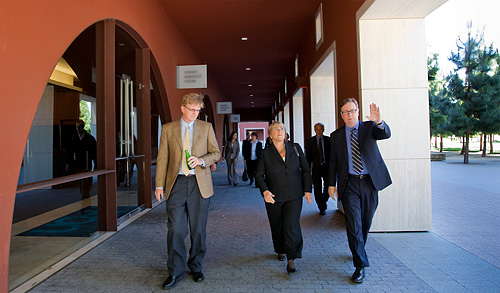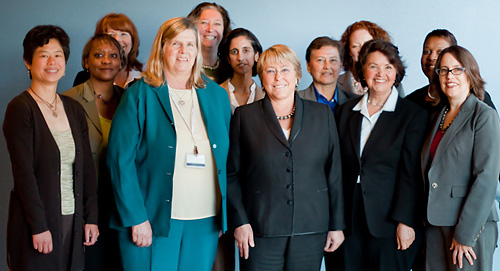Chilean Leader Visits UCSF Mission Bay

Showing Michelle Bachelet around UCSF Mission Bay on May 5, are Douglas Crawford, associate director of the California Institute for Quantitative Biosciences or QB3, and Sam Hawgood, dean of the UCSF School of Medicine.
By Lisa Cisneros and Melanie Fisch
Former President Michelle Bachelet of Chile recently visited UCSF’s Mission Bay campus, where she met with faculty leaders and discussed gender equity and advances in health care and research.
Bachelet, who was the first woman elected president of the Latin American country and served a four-year term that ended in March, was a guest of UCSF Chancellor Sue Desmond-Hellmann, MD, MPH. The two leaders talked about a number of issues during the May 5 visit.
As a pediatrician who has conducted epidemiological studies in the area of HIV/AIDS, Bachelet was interested in visiting UCSF, known worldwide as a premier health sciences institution that has spawned numerous innovations and scientific discoveries. Before becoming president of Chile in March 2004, she served as Chile’s Minister of Health and the first female Minister of Defense.
Bachelet’s trip to the San Francisco Bay Area was hosted by UC Berkeley professors Harley Shaiken and Beatriz Manz, PhD, chair and former chair, respectively, of the Center for Latin American Studies at UC Berkeley.
At UCSF, Bachelet first met with Sally Marshall, PhD, vice provost of Academic Affairs, and a group of nine UCSF faculty members who graduated from the UCSF-Coro Faculty Leadership Collaborative, a program that fosters professional development and career advancement.
The group’s wide-ranging conversation focused on gender equity and leadership issues, touching upon on the importance of women being elected to political office and the benefits that both women and men bring to governance.
Bachelet reportedly embraced equal opportunity from the start, pledging that her government “will fight with all its capacity for the full exercise of women’s rights.” In a speech marking International Women’s Day in March 2007, the single mother of three said, “Women came to Chilean politics to stay. We want a society that includes everybody, where opportunities reach all its daughters and sons.”

Pictured at UCSF Mission Bay on May 5 are, from left, in the front row, faculty members Ida Sim, Vice Provost Sally Marshall, President Michelle Bachelet, Beatriz Manz, Elena Fuentes-Afflick; middle row, Sharon Youmans, Tejal Desai, Alma Martinez, Cherrie Boyer and back row, Susan Kools, Elizabeth Ozer and Judith Moskowitz.
At UCSF, Bachelet shared her experiences in bringing her own personal style to the presidency and discussed her unwillingness to change who she was to fit a “presidential role.” She stressed the importance of respecting others and seeking their cooperation in achieving goals to benefit society.
Meeting Bachelet, who left office with high public approval ratings in Chile, was a special opportunity for graduates of UCSF’s faculty leadership program sponsored by the Chancellor’s Council on Faculty Life (CCFL). Marshall, who chairs the CCFL, is always alert for opportunities to include leadership program graduates in special events.
“The faculty leadership program was created to develop a network of faculty who are trained as leaders at UCSF,” Marshall said. “One of our goals is to offer opportunities for graduates to continue building their leadership skills in a variety of venues. We were very pleased that we were able to offer this unique opportunity to some of our graduates.”
Bachelet specifically requested to tour the UCSF Mission Bay campus, which has been a major catalyst for growth of the San Francisco Bay Area’s biotechnology and life sciences industry. Bachelet was accompanied around the campus by Sam Hawgood, MBBS, dean of the UCSF School of Medicine, and Douglas Crawford, PhD, associate director of the California Institute for Quantitative Biosciences or QB3, which is headquartered at Mission Bay.
For Crawford, who has followed Bachelet’s remarkable career in the media, including reading about her in The Economist magazine and elsewhere, meeting the past president was a pleasure. “She was keenly interested in our research efforts at UCSF and Mission Bay and how we can accelerate discoveries for human benefit,” he said.
Crawford, who guides many guests on tours at Mission Bay and particularly QB3, says visitors are often interested in learning how to promote entrepreneurs in biosciences and technology. Crawford showed Bachelet the QB3 “Garage,” which was created to help launch startup bioscience companies on the UCSF Mission Bay campus and its surrounding neighborhood. Since opening in 2003, the garage has launched more than 20 companies, including four that have successfully landed continued funding or were purchased by larger companies.
Bachelet is well aware of the role of UCSF as the birthplace of biotechnology. Another native of Chile, noted biotechnology pioneer Pablo Valenzuela is a co-founder of Chiron. Valenzuela earned a BS degree in Biochemistry from the University of Chile, a PhD in Chemistry from Northwestern University and did his postdoctoral research at UCSF. Today, Valenzuela supports global collaboration among researchers and sponsors a retreat in Chile for UCSF graduate students.
Photos by Rhyen Coombs
Related Links: